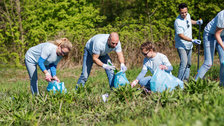by Jennifer Meccariello Layman, Regional Vice President of Association, Student Conservation Association
The city of Pittsburgh has more than 3,000 acres of public parks, greenways and open spaces, which make up 10 percent of the city's land base, and most of its citizens live at a distance that can be traveled on foot (1/4 – 1/2 mile) to a public green space. And yet, every summer I visit the Student Conservation Association the high school teams that work in the parks of the city of Pittsburgh, and I ask the same question: "How many of you have visited this park before coming to work at SCA? " On a good day, one, maybe two members raise their hands reluctantly; On a normal day, nobody does. But at the end of the program, many of them are excited to return to their families to show their accomplishments.
From the construction of trails and structures to the elimination of invasive plants, I see every day how to work in and for the natural world can change a young person.
In the Student Conservation Association, we connect young people with public lands, administration and a more sustainable future. From the construction of trails and structures to the elimination of invasive plants, marking and monitoring of wildlife and green infrastructure, I see every day how to work in and for the natural world can change a young person. The combination of challenging outdoor work, projects that are important to the community, and the opportunity to work as a team strengthen the life skills that foster continued growth in high school and the young adult members who work with us. Participants enjoy improved levels of individual leadership, social responsibility, self-confidence, emotional competence, communication, decision making and more.
SCA's long-term partnership with the City of Pittsburgh, as well as with many other public and private partners throughout the community, allows us to affect directly to the city and the region by introducing young people into a conservation job at a time when they are more open to it. SCA programs have an incredible impact on urban communities like Pittsburgh, where residents can have limited access to nature, learning through service, employment and other resources. After 60 years of involving young Americans in practical service to the land, in national parks and urban green landscapes, SCA has refined a unique and dynamic process so that young people can become the best they can be.
SCA programs are incredibly powerful in urban communities like Pittsburgh, where residents can find limited access to nature …
Seven out of 10 SCA students are working in careers or studying in fields that make the planet more sustainable. Ninety percent of them work actively to reduce their carbon footprint on a daily basis. And three quarters of them regularly use alternative transport.
Due to their experience with SCA, young participants are more connected to nature and more committed to conservation values, and also benefit from important advances in its prosperous mentality, which we know through research, it is powerful to open the door to a life of new experiences through which continue to build the knowledge, skills and social connections necessary to succeed and lead.
At a time when social justice issues dominate our national and local dialogue, and when climate change is affecting our planet and our city of In an unimaginable way, SCA's mission to create new generations of conservation leaders has never been more important.
–
Jennifer Meccariello Layman is Regional Vice President of Society for the Student Conservation Association. She is working for her Black Belt in Innovation Engineering and recently completed a research grant with the Graduate School of Education at the University of Pittsburgh focused on connected learning in after-school programming. She lives in Pittsburgh with her husband and two children.


Be First to Comment